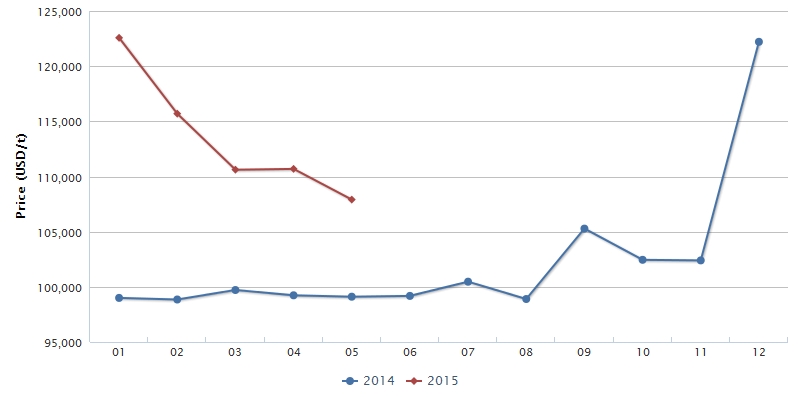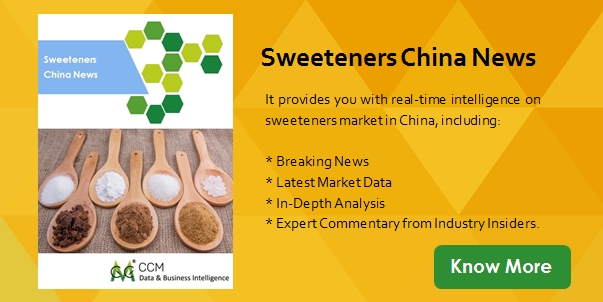Summary: In 2015, the prices of stevia
sweeteners declined constantly in China, mainly due to the sufficient supply of
raw material and the follow-up price adjustment by stevia sweetener producers.
As a whole, however, the market is still prospective this year, thanks to the
increased demand from Europe and America.
In 2015, the prices of stevia sweeteners
constantly declined in China. In June, the ex-works price of stevia sweetener
(RA95%) was USD106,197/t (RMB650,000/t), down by 10% over that of USD122,569/t
(RMB720,000/t) in January. This is mainly because with a sufficient supply of
raw material, the producers gradually adjusted the prices to meet the client
enquiry.
Ex-works price of China's stevia sweetener
(RA95%), January 2014-May 2015

Source: CCM
In 2015, the planting area of stevia leaf
(centred in Gansu, Heilongjiang, Anhui provinces, Jiangxi Zhuang Autonomous
Region, etc.) is estimated to reach around 10,000 ha (150,000 mu), a large rise
over that of 3,333 ha (50,000 mu) in 2014. This, of course, guarantees the
supply of raw material to the stevia sweetener enterprises.
In 2014, the short supply of stevia leaf in
the market led to the insufficient raw material for enterprises to produce
stevia sweeteners, which then propelled enterprises to up-regulate the price of
stevia sweetener (RA95%), from USD99,000/t (RMB600,000/t) in January to
USD122,211/t (RMB750,000/t) in December. Such a skyrocketed price caused
discontent amongst downstream clients.
Now the price of stevia sweetener (RA95%)
still stays very high, however expected to continue declining when large
quantities of stevia leaves are put onto the market during June-September.
"If the ex-works price is between USD99,000/t (RMB600,000/t) and
USD106,197/t (RMB650,000/t), it is in a rational range", said an industry
insider.
Despite the price declines, the stevia
sweetener market, as a whole, shows a bright prospect. This can be ascribed to
the increased demand from the downstream markets in Europe and America. In
2014, both Coca-Cola Company (in the US) and PepsiCo Inc. (in the US) launched
the stevia sweetener-enriched carbonated beverages onto the market. From then
on, the enterprises throughout the world, especially from Europe and America
have constantly put the-like new products onto the market, such as candy,
beverage, biscuit and children's toothpaste. It is predicted that the global
sales of stevia sweeteners will exceed USD500 million in 2015, up by over 5%
YoY.
Under such a circumstance, Ganzhou Julong
High-Tech Industrial Co., Ltd. (Julong High-Tech) also intended to again join
in the market competition. In H1 2015, Julong High-Tech increased the input
into environmental protection and halted production for equipment
reconstruction, expected to restart production this year.
Julong High-Tech was ever one of the
leading stevia sweetener enterprises in China, capacity given at 4,000 t/a. In
2011, many domestic enterprises expanded the production capacity, resulting in
oversupply and sluggish market. Due to the simple product mix (only stevia
sweeteners), Julong High-Tech presented poor risk resistance and thus
encountered capital chain interruption. In June 2013, Julong High-Tech finished
the equity reorganisation, from which the debtees holding USD99.67 million
(RMB610 million) were transferred into shareholders. After 2-year development,
as of February 2015, the bank loans and accounts payable were reduced by about
USD17.97 million (RMB110 million) in total.

About CCM:
CCM is the
leading market intelligence provider for China's agriculture, chemicals, food
& ingredients and life science markets. Founded in 2001, CCM offers a
range of data and content solutions, from price and trade data to industry
newsletters and customized market research reports. Our clients include Monsanto,
DuPont, Shell, Bayer, and Syngenta. CCM is a brand of Kcomber Inc.
For more
information about CCM, please visit www.cnchemicals.com or get in touch with us
directly by emailing econtact@cnchemicals.com or calling
+86-20-37616606.